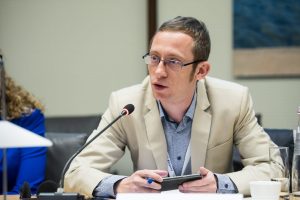At $46 billion each year, philanthropy spends more on health-related issues than anything else. It’s one quarter of all grantmaking, and philanthropy has provided critical funding for vaccines, medical equipment, social welfare and global health infrastructure as the Covid-19 pandemic unfolded. But there’s also intense debate about how the largest foundations interact with governments, international bodies and pharmaceutical companies, and who should hold them accountable. Alliance delved into this topic with our new, free-to-download December issue.
For our webinar on this subject, we brought in the two guest editors – Julia Greenberg, director, Governance and Financing, Public Health Program, Open Society Foundations and Aggrey Aluso, manager of Health and Rights Program, Open Society Initiative for Eastern Africa – as well as Steven Allen, co-executive director of the Validity Foundation, who wrote a piece in this issue on mental health and human rights. The webinar was moderated by Alliance’s executive editor, Charles Keidan.

Julia Greenberg
Greenberg began with her reflections. After being asked to guest-edit the magazine during the height of the pandemic when ‘OSF was exploding in every direction’ and she had to figure out how to balance a child off school whilst working from home, there was every temptation to decline the offer. ‘But after I collected myself, I realised I couldn’t pass up the opportunity. I was aware somewhere in the back of my mind that the pandemic was laying bare all of the possibilities of global health philanthropy, but also all of the perils and problems.’ Greenberg expanded on what they hoped to bring forward:
Firstly, ‘a reckoning with the fact that philanthropic actors and entities working in global public health are part of a geopolitical and economic power structure, whether we like it or not.’ Funding choices need to be made with a clear understanding of the context. Greenberg asked the audience to read the interview with Dr Tedros, WHO’s director general, ‘for his moving words about how he had to negotiate the politicisation of health as he was leading WHO through this unprecedented pandemic.’
Secondly, ‘we wanted to shine a spotlight on the fact that the scale of global health philanthropy is huge. The sheer amount of dollars and the unfortunate narrative that we and our management consultants know best, plays a role in eroding faith in the notion that the state can – and should – take care of the health of their own citizens.’ This can lead to huge consequences down the road, where funding contributes to the privatisation of health care systems. Based in the US, Greenberg states that it’s important to question whether her country’s healthcare model is being exported ‘to middle and low-income countries through conditions tied to our funding.’ Here she asked the audience to delve into a piece on Ugandan maternal health funding, written by Angela Nguku.
‘The lack of democratic governance across the global health sector is something that we really need to look at and, from my perspective, we really need to beef up.’
Seeing the first pictures of UK citizens receiving their COVID-19 vaccinations was a joyful sight. However for Greenberg, ‘as a funder of health and economic justice, I couldn’t help but also think about the latest stats… only 1 out of 10 people in 70 middle to low-income countries will get their jabs by the end of next year, while the rich world can vaccinate their people in some countries as much as five times over’.
Greenberg went on to mention the Bill & Melinda Gates Foundation, which has brokered deals with 15 pharmaceutical companies to expand global access to Covid-19 therapeutics, diagnostics and vaccines. ‘Of course, that sounds good… But let’s be real. Vaccines were overwhelmingly developed with public money from US and European countries… these kinds of philanthropic-private sector partnerships run roughshod over deeper efforts to change the intellectual property rules and monopoly-pricing that enable pharmaceutical companies to massively profit off of the pandemic by selling vaccines that were developed by taxpayer money.’ Greenberg argues that it should not be the role for either private foundations or pharmaceutical countries to set the terms for access for low-income countries in a pandemic, but rather for national governments – held accountable by civil society and multilateral institutions.
Greenberg finished her comments by providing several ideas to provoke discussion, both within the webinar but also in the work moving forward:
- Mind the gaps but don’t fill them: Global health philanthropy has taken up controversial issues that have been difficult for national and donor governments, due to stigmatisation and privatisation – including access to sexual and reproductive health rights and abortion services, access for health in socially excluded and criminalised groups like migrants, trans, lesbian, gay and intersex people, and sex workers. This needs to keep going, argues Greenberg, but not in perpetuity. It’s necessary to support citizens to push governments on this.
- Support the system changers: Greenberg finds inspiration in NGOs and movements calling for a people’s vaccine; national advocacy around the globe for publicly funded healthcare systems which are sustainable; the fight for Medicare for All in the US; and the fight for universal health coverage in Kenya.
- Support local organisations and actors to reform their health systems as they see fit, and resist supporting massive international organisations who work – ‘supposedly’ – on behalf of beneficiaries in low-income countries. ‘I just don’t think philanthropy should be funding the multi-million dollar contracting organisations that work for donor governments and are extracting wealth from low and middle-income countries rather than supporting sustainable development.’
- Racism and economic inequalities are public health crises which need to be addressed cross-sectorally. ‘What we need is to actively seek partnerships with economic and racial justice funders and movements… it’s about understanding and being willing to take on their priority issues like criminal justice reform or debt relief as matters of public health.’
Keidan described the situation as a ‘tug of war’ between the foundations who are more likely to engage with civil society and to think about the impact on local populations, and those who work to the more ‘elite level’ with contracting organisations, governments and pharmaceutical companies. Keidan asked if Greenberg sees this as a healthy tension.
Greenberg responded that she was not sure she’d see it as a healthy tension due to the sheer scale of the funding coming from private sector and private foundations into public systems. ‘I just don’t think, given the current context, the distortion of the levels of funding coming from private actors and philanthropy and the deep influence they have over multilateral institutions and national governments in their health decision making, that we can say it’s a healthy tension.’

Aggrey Aluso
Aluso was next to speak. ‘It’s very stark to us that we are facing some unique challenges, a lot of which had to do with the subject matter of the publication in terms of how philanthropy has been structured over the years, and whether that has helped – or not helped – develop health systems to be able to respond to, and be resilient to, conditions like what we are facing now.’
The reality in Africa is that the health system is very fragile. ‘Most African countries are barely able to manage the Covid-19 pandemic, and we’re just counting our luck that it has not been as devastating as it has been elsewhere, otherwise we don’t know how this would have been.’ Aluso wanted to acknowledge the donor dependence from African countries, particularly in the health sector. ‘Governmental and philanthropic donors provide over 40 per cent of all health spending in nine African countries – [that means they’re] literally running the health sector in those countries.’
This mode of health funding creates a particularly precarious and unhealthy dependency. ‘These donations, or philanthropic gestures, come with strings attached and… the data shows pre-eminence of private foundations and donor governments coming in with their own geopolitical interests, or niche, through the funding that they give.’
And yet, despite the colossal giving to the health sector, philanthropy has not caused meaningful transformation in sub-Saharan Africa. ‘We have countries like Uganda – at the beginning of the pandemic, there were only 57 ICU beds against a population of 35 million. A country like Kenya had about 300 ICU beds for a population that is nearly 50 million, so if things got to the level where it was in Europe and the US, the capacity to offer critical care is basically non-existent.’
Health philanthropy depoliticises health in Africa and compromises political accountability, argues Aluso. ‘Health has been framed as a charitable issue that people accept whatever they get and don’t expect much from the government because of this widespread notion that it’s covered by the donors and therefore domestic governments get off scot-free… I think the pandemic provides an opportunity to reflect on the complicated political and economic role that we play in this space.’
Keidan brought in a comment from one of the webinar attendees, Frances Lovemore, medical director of the Amani Trust: ‘Governments need to learn to budget to provide adequate healthcare facilities for its citizens. The responsibility is being shared because the donors pick up the heavy tabs.’ Keidan asked Aluso to comment on this, and what he thinks would need to change in philanthropy for the situation to change.
Aluso completely agreed with the comment. ‘Philanthropy is not bad, but [it] needs to be strategic in terms of building the capacity of the government to be able to hold their states. …The donor has created the dependency that has disempowered [citizens] from asking their national governments the hard questions. In Africa, most health services are delivered through very charitable framing and we have accepted that, and philanthropy has come and reinforced that attitude towards health. I think that needs to change so that we can empower people to seek this as an entitlement, as a right, that has a political cost.’

Steven Allen
Allen was last to speak on the field of mental health funding. Allen is based in Hungary, but the Validity Foundation works across Eastern Europe and Eastern and Southern Africa. ‘Stigma, discrimination, poor implementation of policies and inadequate participation of beneficiaries of funding are some of the key barriers that donors and investors must be sensitive to when targeting their investments.’ However, Allen was keen to stress that a better way to improve psychological and social wellbeing is to move beyond public health discourse – toward human rights.
‘My central argument is that investments in this field must instead be guided by a philosophy of human rights, and that really does push us well beyond the public health paradigm. Investing in this right alone cannot be an adequate response to dealing with the structural and institutional barriers which exclude, isolate, segregate and degrade the position of people with psychosocial disabilities across so many of our societies. Indeed, the discourse of psychosocial disability is about reclaiming participation, reclaiming citizenship, reclaiming human rights.’
Allen argues that such a limited focus on investing in healthcare infrastructure has the potential to do harm, particularly to movements led by people with psychosocial disabilities. Allen states there are a few reasons for this:
- There’s a risk that investing in mental health in a discrete manner, as opposed to investing for example in the inclusion of persons with psychosocial disabilities, will result in replicating coercive and other human rights-violative forms of psychiatry. This includes the indefensible practices of ‘involuntary detention, involuntary treatment, seclusion and restraints as valid forms of treatment. …these practices clearly breach core human rights standards, and they cause incredible harm.’
- There’s a real risk that increased interest and investment in the field of mental health will actually strengthen the power that some global corporates have who are interested simply in opening new markets – particularly for psychopharmaceuticals. ‘This medicalised approach again reduces people with psychosocial disabilities to objects of charity, and does nothing to challenge the disabling barriers which so often negatively impinge upon their mental wellbeing… We already see evidence of investments coming from the major pharmaceutical firms in parts of sub-Saharan, Eastern and Southern Africa, which are really pushing and in fact influencing the course of mental health legislative reform.’
- This debate around mental health is becoming dominated by the voices of professionals and practitioners. ‘There’s a long tradition of this in many of our societies in the global north as well as the global south, of people speaking for people with mental illness, speaking on behalf of those who are disordered, deciding for those people instead of respecting their autonomy and respecting their own ability to choose. This is a fundamentally outdated and flawed charity-based approach.’
Allen concluded that investments in this area must be empowering – ‘as much as any other area of social justice… they must advocate for full respect of human rights, and it is important that reforms include and are led by those who are supposed to benefit – that is, persons with psychosocial disabilities.’
The webinar then turned to questions, both from Keidan and the audience. Keidan asked Greenberg her thoughts on the debates around mental health funding, from her role within an important foundation – both in the US and globally. With the World Bank and WHO starting to organise high-level meetings around this issue, it’s ‘exactly the moment where this community-centred, rights-centred discourse has to be really strengthened, and that advocacy groups need to be supported at all levels – from the local to the national to the global – to intervene.’
Raymond Ampil of Fondation Chanel asked the panellists how their institutions engaged with the geopolitical issues and analysis of countries and regions in order to inform their grantmaking and advocacy work.
Aluso answered first. ‘I think it’s an enduring challenge that we are all very aware of and I think we are cognisant, for us who work in philanthropic organisations in these predominately aid-receiving regions, with a lot of policies being set outside this region that affect the architecture of health financing.’
Greenberg then continued, stating the unique privilege of working at OSF is their global network across human rights and social justice issues, which allows them to do the political analysis of their work, and gave a specific example about Kenya. ‘It would have been impossible to do the kind of funding we did without understanding why the Kenyan government was pushing so hard on the universal health coverage agenda. We learned all of the national and political issues from Aggrey, from grantees, about how President Kenyatta really sees this as a legacy issue… and that because of his national and political aspirations, we needed to make sure that we were funding groups to actually push for transparency on what’s happening on the ground, and to make sure that the government is held accountable for the rollout of UHC.’
‘The sheer amount of dollars and the unfortunate narrative that we and our management consultants know best, plays a role in eroding faith in the notion that the state can – and should – take care of the health of their own citizens.’
Sylvia Brown from Smarter Donors asked Greenberg what her advice would be to the millions of individual donors who want to support health in emerging markets, but are not foundations or billionaire donors. Greenberg responded that it depends on personal preference, but cited Doctors Without Borders, the network of Urgent Action Funds and the African Women’s Development Foundation.
Ann Campbell of the Validity Foundation asked a question of Greenberg, which Allen responded to. How can we reframe the ‘burden of disease’ terminology narrative to something more effective?
Allen replied that mental health financing has become dominated by the medicalised approach. ‘We really need to give a primary position to the final beneficiaries and we don’t see anything like that at present. …One of the issues around that is that it requires engaging directly with organisations of persons with psychosocial disabilities. Unlike other, broad health rights campaigns, [they] are invariably tiny, invariably unable to access general funding sources, sometimes even from some of the foundations here because they’re not going to meet registration requirements in their countries.’ Validity works with small networks like these, ‘and we regularly try to discuss with donors and others how to provide the support, the platforms, that are necessary to get those voices out there. I think we’re far from that right now.’
The final question came from Giles Sioen from Future Earth, who asked how the panellists are thinking of integrating science into their funding priority setting.
Greenberg said there’s a movement toward implementation, science and community-based research ‘which is a missing piece of the puzzle. …We really need to know how scientific interventions and public health interventions play out at all local levels, or all the research in the world won’t make change.’ Secondly, it’s important to reflect on who is really guiding the global health research agenda. ‘The lack of democratic governance across the global health sector is something that we really need to look at and, from my perspective, we really need to beef up.’
Aluso reflected on how research and development is ‘one of the biggest gaps that we see in most African countries.’ In Kenya for instance, ‘there’s a recently completed study which shows that the government supports 0.01 per cent of the research done, so the bulk of it comes from outside. And of course, those who dictate the agenda dictate what gets prioritised – that’s the way of influencing prioritisation. It’s one of these very strategic areas that I think philanthropic organisations should direct their attention to such gaps, so that we can have more indigenous-informed research agendas that therefore will influence priorities that need to be addressed from genuine understanding of the needs of the locals.’
Allen’s final comment also linked to research. ‘People with ‘mental health issues’ have regularly and often been objects of research, but they’re rarely seen as subjects of human rights. If we want to really support a catalysing development agenda to improve dignity and human rights, then we need to be seeing people with psychosocial disabilities as the researchers, coming up with the solutions that donors should then be investing to improve inclusion at the community level. We’re starting this research in Uganda, we’re doing some of this research in Zambia, I think we’re already seeing some really interesting ideas emerge about how to link traditional and non-conventional forms of service with conventional services.’
Amy McGoldrick is the Marketing, Advertising & Events Manager at Alliance.
Watch a recording of the full webinar below:






Comments (0)